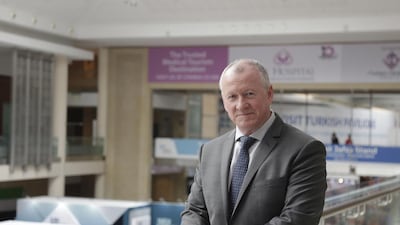DUBAI // The world needs to spend a further US$1.3 billion (Dh4.7bn) to wipe out polio, says the World Health Organisation.
The world is closer than ever in achieving that goal, but more money is needed to reach children in operationally challenging areas, according to Christopher Maher, manager for polio eradication and emergency support at the WHO.
“By eradicating polio, the world will reap savings upwards of $50bn – funds that can be used to address other pressing public health needs,” said Mr Maher, who has led operations to eradicate polio across Asia, Africa and Europe.
“Failure to eradicate polio would result in a global resurgence of the disease, with 200,000 new cases every single year within 10 years, all over the world.”
He said polio should remain a global priority despite the worldwide trend of donor fatigue.
“I believe that polio eradication is still a priority for international donors,” he said.
“We are optimistic that we can continue to sustain support from donors. However, managing the flow of funds is always a challenge and we really want to encourage both our existing supporters and new supporters to keep providing the funds needed to do the job.”
Polio is an infectious disease caused by the poliovirus and in a small percentage of cases can cause muscle weakness that means that sufferers are unable to move.
Mr Maher, 56, has been involved with the polio eradication programme for more than three decades. He has organised local vaccination campaigns, investigated cases of paralysis and managed the technical elements of the programme.
He said he was happy with the progress made, as there were only 37 cases of polio recorded globally last year, down from 74 in 2015, and he believes that polio can be wiped out by the end of this year.
But nomadic populations are proving a challenge.
“When the task of reaching mobile populations is put into the broader context of trying to reach more than 30 million children under the age of five in every national immunisation round, it’s easy to understand how difficult it is,” Mr Maher said.
Communication with communities is important and a reason why vaccinators are chosen from within communities. “So we have people who are trusted and who can communicate effectively,” Mr Maher said.
“The vaccinators are the real heroes of polio eradication because they do the hard work of reaching every family and community with vaccines.
“Sometimes, in the context of Pakistan and Afghanistan, it is a dangerous job. We owe a great deal of gratitude to the vaccinators who do their job despite the difficulties and dangers.”
Mr Maher also praised the UAE’s support for the Global Polio Eradication Initiative (GPEI), which has played an important role in reducing polio cases by 99 per cent since 1988.
Polio is now close to becoming the second human disease, after smallpox, to be eradicated.
In 2011, Sheikh Mohammed bin Zayed, Crown Prince of Abu Dhabi and Deputy Supreme Commander of the Armed Forces, and the Bill and Melinda Gates Foundation announced a partnership that made a combined donation of $100 million to buy and deliver vaccines to children in Afghanistan and Pakistan.
In 2013, the UAE hosted the inaugural Global Vaccine Summit in Abu Dhabi, where Sheikh Mohammed committed a further $120m between 2013 and 2018.
Part of the pledge specifically su gpports polio vaccination activities in high-risk areas of Pakistan.
The GPEI is a public-private partnership led by national governments with five partners – the WHO, Rotary International, the US Centres for Disease Control and Prevention, Unicef and the Bill and Melinda Gates Foundation.
Since the GPEI’s launch in 1988, more than $14bn has been invested through WHO and Unicef in support of polio eradication activities in more than 70 countries.
akhaishgi@thenational.ae

